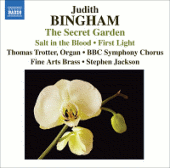|
Judith Bingham – Choral Music
 BBC Symphony Chorus/Stephen Jackson BBC Symphony Chorus/Stephen Jackson
Thomas Trotter – organ; & Fine Arts Brass
Salt in the Blood
The Darkness is no Darkness
First Light
The Snows descend
The Secret Garden
Naxos 8.570346 [2004-05, TT: 68 minutes]
This CD brings together a representative collection of works by the contemporary composer Judith Bingham. Her specialities are writing for chorus, organ and brass, and all three are well displayed here.
It includes two major works; one for chorus and brass ensemble, the other scored for chorus and organ.
Salt in the Blood , dating from 1995 is described as a musical ghost story. It opens with a very eerie depiction of a tall ship slowly appearing out of the mist. As it gets nearer the voices of the sailors emerge singing a shanty like drinking song and arguing amongst themselves. Suddenly the wind and waves gather strength – gale force six (the descriptive words of the Beaufort Scale are melded into the text), and Daniel Stone slips and falls to his death. “Did Billy le Bec help him on his way?” The question is posed as the storm abates we are told that the ship's deck is found covered with dying seabirds, “the spirits of sailors lost at sea”. The sails can be re-rigged and the challenge rings out to Billy to climb to the very apex of the mast and rig the seldom used “moon-sail” – as the mist clears he is found hanged in the shrouds.
The Secret Garden was a commission for the 2004 Proms. It depicts a vision of the Garden of Eden after the expulsion of Adam and Eve. Darkness has fallen and the night scented flowers, named by their detailed botanical names, begin to open. They are joined by “hawk moths and sphinx moths, mysterious and sombre in their nocturnal plumage”. In an imaginative piece of writing, the organ melody cuts through the choral line mimicking the insects as they flutter and swoop, followed by an organ solo representing the synergy between plants and insects. Finally decay sets into the abandoned garden, and only seeds remain to give hope for the future.
A most original and intriguing collection. My one reservation would be that many of the words of the chorus are difficult to distinguish. However, the CD booklet contains full texts and the composer's own notes.
Serena Fenwick {March 2007]
Choral Music 1997-2007
Gleams of a Remoter World
The Shepheardes Calender
Water Lilies
Irish Tenebrae
Unpredictable but Providential
Beneath these Alien Stars
Ghost Towns of the American West
BBC Singers/David Hill
Richard Benjafield percussion Chris Brannick percussion Iain Farrington organ Krysia Osostowicz violin Olivia Robinson soprano
Signum Classics SIGCD144 [71 mins]
Another fine disc from this prolific choral composer, recorded by the leading UK professional group, the BBC singers, of which she was a one-time singing member. It comprises a powerful selection from the last decade, and the introduction of a few instrumental soloists gives the disc an extra focus, notably organ fiddle and drums in the powerful
Irish Tenebrae, which expresses the "overtones of violent revenge"stemming from her experiences of the Irish 'Troubles'.
Bingham has a flair for finding suitable texts, which are worth studying in their own right, comparable with benjamin Britten's.
The notes by the composer herself are very personal, and are printed in clear black on white glossy paper, together with all the texts. So it is a good disc to follow with booklet in hand, but if youre not sure if it is for you, all is easily to be found complete on line at http://www.signumrecords.com/catalogue/sigcd144/index.shtml with three representative sound clips to sample the complete professionalism of singing, support instruments and the recording quality at St Paul's Knightsbridge early 2008.
A terrific disc which will be released after the New Year holidays and should have a very wide appeal; and it goes very well with the other for larger forces reviewed above.
Peter Grahame Woolf
[December 2008]
|

